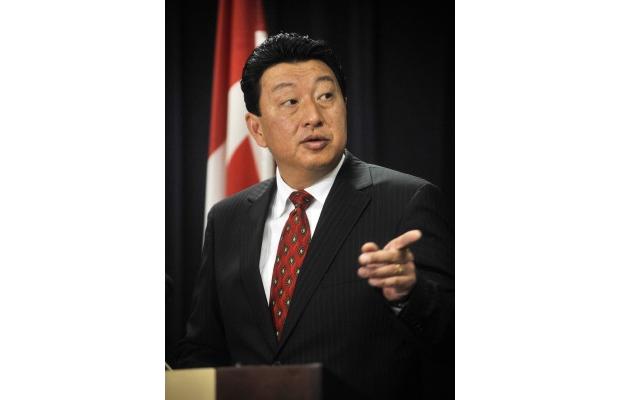[When a B.C. legislative committee pared down police complaint commissioner Stan T. Lowe’s budget request, the OPCC-friendly Victoria Times Colonist portrayed the decision as “disastrous.” The OPCC’s real problem, however, is its bias, cronyism and dishonesty.]
Police complaints process
beset by funding worries
Criminologists criticize MLAs’ paring down of budget request
Rob Shaw, Victoria Times Colonist, Oct. 11, 2010
Stan Lowe: “They’ve passed this legislation.
It’s important they fund it appropriately.”
Photo: Ian Lindsay, Postmedia News
B.C.’s independent police complaints process is headed for a disastrous end if it’s not properly funded by the B.C. government, say criminologists.
A decision by Liberal and NDP MLAs last week to reject police complaint commissioner Stan Lowe’s request for more staff to handle a sharply rising workload is a concerning step backward for B.C.’s police oversight, said Dave MacAlister, a Simon Fraser University criminologist who specializes in police accountability.
Lowe asked the government for an additional $305,000 to hire seven new staff and an office assistant, but skeptical politicians recommended he receive only an extra $65,000 for staff and $20,000 for capital spending.
“It’s a disaster,” said MacAlister. “I think we’re just fooling ourselves if we think we’re making significant change and we’re not willing to fund it. We’re really not getting any further forward.”
Lowe said his staff, who oversee public complaints filed against 11 municipal police forces, are struggling under triple their normal caseload because B.C.’s revamped police laws have made it easier for people to file complaints.
But he faced skepticism from NDP and Liberal MLAs on the legislature’s standing finance committee last Wednesday.
Politicians repeatedly quizzed Lowe on how many complaints end up being substantiated and whether his staff could somehow vet and dismiss vexatious allegations to reduce the overall workload.
While only 10 to 12 per cent of complaints end up substantiated, the office is obliged to investigate every one that fits into the 12 categories listed under the law, said Lowe.
Politicians shouldn’t be surprised by the rising number of complaints, given that the government’s redraft of the Police Act in 2009 was intended to renew public confidence and encourage more people to submit grievances, MacAlister said.
Now that the process is working, politicians seem to want to undermine it rather than fund it, he said.
“It’s bizarre, it doesn’t make any sense to me,” MacAlister said. “The whole area of police oversight and investigation of police wrongdoing required a major overhaul, and it should have been made clear that would be a resource-intensive change and we had to be willing to commit to that.”
The government’s money woes have put the squeeze on organizations like the police complaint commissioner, said Rob Gordon, SFU’s criminology director.
“Everybody who is running a government agency at the moment is suffering in similar ways,” he said. But Lowe’s office has a statutory obligation to handle complaints a certain way and can’t simply cut costs to satisfy government bureaucrats, Gordon said.
The finance committee’s showdown with the police complaint commissioner was further complicated by the presence of two former solicitors general, John van Dongen and John Les, who suggested Lowe could interpret the new law in a way that might allow him to reduce his workload.
That’s not what van Dongen said in 2009, when he was the solicitor general who unveiled the new Police Act. At the time, he told reporters his staff worked many months to carefully write detailed legislation that followed all 91 recommendations made by Justice Josiah Wood in his white paper on police reform.
Last week, van Dongen told Lowe “there is a lot of room for interpretation in how we implement legislation.
“I think we’re looking for a solid, defendable complaint process, but we’re also looking for one that meets the test of value for taxpayer dollars when we benchmark it against all of the other critical needs that the people in the province have,” he said.
The motion to undercut Lowe’s funding request actually came from the NDP’s Doug Donaldson, vice-chairman of the committee.
NDP finance critic Bruce Ralston accused Lowe of “creating an impression of problems” about the quality of police investigating themselves.
“I was surprised to hear that the quality of the investigation in even a relatively routine complaint requires continuous intervention by your office,” said Ralston.
“If anything, my personal experience would be that internal investigations are probably tougher on the police than maybe the members of the public ordinarily would expect or suspect.”
A clearly frustrated Lowe told the politicians that if they don’t want to see so many complaints, they could amend the law to remove what they consider less serious grievances.
“We’re not proposing amendments and I don’t think that approach is terribly helpful, frankly,” Ralston shot back.
In an interview after the meeting, Lowe said his job of overseeing complaints about the police “is often misunderstood,” even by politicians.
“They’ve passed this legislation. It’s important they fund it appropriately for it to be successful,” he said.
“They’ve asked for an audit three years from now and they have to be able to adjust their expectations for this audit by virtue of the funding.”
Back to
The OPCC has a big problem but it’s not money
